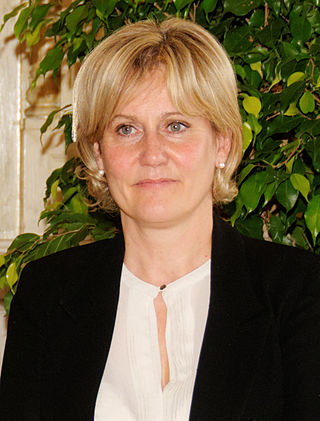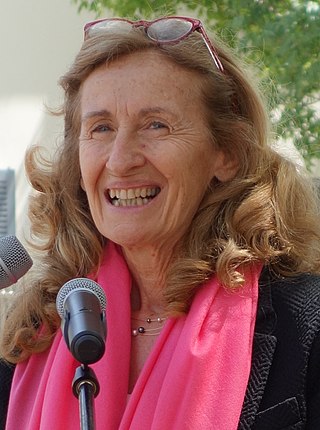Related Research Articles

The Radical Party of the Left is a social-liberal political party in France. A party in the Radical tradition, since 1972 the PRG was a close ally of the major party of the centre-left in France, the Socialist Party. After the 2017 presidential and legislative elections, negotiations to merge the PRG with the Radical Party began and the refounding congress to reunite the parties into the Radical Movement was held on 9 and 10 December 2017. However, a faction of ex-PRG members, including its last president Sylvia Pinel, split from the Radical Movement in February 2019 due to its expected alliance with La République En Marche in the European elections and resurrected the PRG.

Christiane Marie Taubira is a French politician who served as Minister of Justice of France in the governments of Prime Ministers Jean-Marc Ayrault and Manuel Valls under President François Hollande from 2012 until 2016. She was a member of the National Assembly of France for French Guiana from 1993 to 2012 and member of the European Parliament from 1994 to 1999.

Éric Woerth is a French politician of Renaissance.

Nadine Morano is a French politician of the Republicans who has been serving as Member of the European Parliament since 2014. She previously was a member of the National Assembly and a minister.

Georges Vincent Antoine Fenech is a French former magistrate and politician. A member of The Republicans (LR), he represented the 11th constituency of the Rhône department in the National Assembly from 2002 to 2008 and again from 2012 until 2017. He has been a legal affairs consultant for the CNews television channel since 2017.

The 1st constituency of French Guiana is one of two French National Assembly constituencies in the French Guiana département. Located in the eastern third of the department, the constituency contains the capital city of Cayenne.
Patrick Maisonneuve is a French lawyer of criminal law. He began his legal practice in 1979, and is known for taking on widely reviled high-profile clients that other lawyers have shunned. In 2013 and 2014 GQ ranked him the sixth most powerful lawyer of France.

Richard Malka is a French lawyer, comics writer and novelist. As lawyer Malka in 2007 successfully defended Charlie Hebdo editor Philippe Val against charges of racism following the magazine's publication of Mohammad caricatures. Other clients include Clearstream, Dominique Strauss-Kahn and Caroline Fourest.

In French law, the ministère public or le parquet is the authority charged with defending the interests of society and of the application of law. It is primarily made up of magistrates, but is sometimes represented by other persons such as police officials. Its magistrates can be referred to as "standing" magistrates, as opposed to magistrats du siège. Its closest equivalent in some English-speaking countries is the director of public prosecutions and the attorney general in others.

Quotidien is a French television show, first broadcast 12 September 2016 on the channel TMC. It is presented by Yann Barthès.

Éric Dupond-Moretti is a French-Italian lawyer and politician who was appointed Minister of Justice in 2020 by President Emmanuel Macron. As a criminal defence lawyer, he is renowned for his number of acquittals which earned him the nickname "Acquitator", some of the controversial figures he defended, as well as his outspoken personality.

Stéphane Mazars is a French lawyer and politician of La République En Marche! (LREM) who has been serving as a member of the French National Assembly since the 2017 elections, representing the department of Aveyron's 1st constituency

Nicole Belloubet is a French jurist and politician who has been serving as Minister of National Education in the government of Prime Minister Gabriel Attal since 2024.
Pierre Truche was a French magistrate. He notably prosecuted Klaus Barbie during his trial in 1987.

The Ministry of Justice is a ministerial department of the Government of France, also known in French as la Chancellerie. It is headed by the Minister of Justice, also known as the Keeper of the Seals, a member of the Council of Ministers. The ministry's headquarters are on Place Vendôme, Paris.
Jean-François Ricard is a French magistrate, and since 25 June 2019 the first prosecutor of the National Terrorism Prosecution Office a parquet for the prosecution of terrorism in France.
Jean-Louis Pelletier was a French criminal lawyer.
In French criminal law, the investigation phase in a criminal proceeding is the procedure during which an investigating judge gathers evidence on the commission of an offense and decides whether to refer the persons charged to the trial court.
References
- ↑ (in French) "Coignard : le Syndicat de la magistrature, succursale de LFI", Le Point , 15 September 2023.
- ↑ (in French) "À la Fête de l’Huma, le Syndicat de la Magistrature en mode «police bashing»", Le Journal du Dimanche , 12 September 2023.
- 1 2 (in French) "Le Syndicat de la magistrature paie pour son «mur des cons»", Le Figaro , 18 July 2013.
- ↑ (in French) ""Mur des cons": qui sont les heureux élus?", L'Express , 25 April 2013.
- ↑ (in French) ""Mur des cons" : Christiane Taubira saisit le Conseil supérieur de la magistrature", France 24, 25 April 2013.
- ↑ (in French) "Affaire du «Mur des cons» : le RN et Robert Ménard gagnent en appel", Le Parisien , 19 December 2019.
- ↑ (in French) "«Mur des cons» : la condamnation de l'ex-présidente du Syndicat de la magistrature définitivement confirmée", Libération , 12 January 2021.
- ↑ (in French) "Philippe Bilger : « Le mur des cons a fracturé la confiance dans la justice »", Le Point , 11 October 2019.
- ↑ (in French) "Éric Dupond-Moretti "n’est plus notre interlocuteur", "il n’est plus crédible", affirme le Syndicat de la magistrature", francetvinfo.com, 30 September 2020.
- ↑ (in French) ""Ce n'est pas la justice": Éric Dupond-Moretti s'en prend au Syndicat de la Magistrature", BFM TV, 14 September 2023.